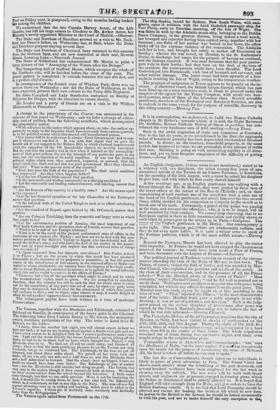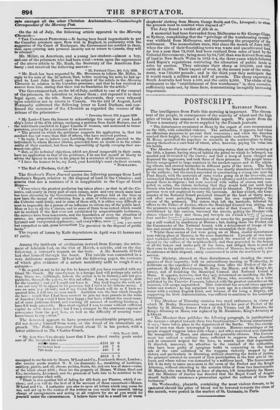An English clergyman, (whose name is not mentioned,) stated to
be a widower with two daughters, the eldest twenty-five years of age, committed suicide at the Tavern de las Cuatro Naciones, at Barcelona, on the morning of the 28th August, with a razor he asked his daughter to give him, and with which be first coolly shaved himself.
A few evenings ago, as an English gentleman was walking with a friend through the Rue St. Honore, they were jostled by three men of
the lower orders at the corner of the Rue de ; and, on their complaining of such conduct, one of the assailants took a cane out of the hand of the English gentleman, and struck him over the face several times, whilst another hit his companion so violently in the mouth as to break one of his teeth. Fortunately, a patrol of the police was pausing at the time, and arrested the offenders ; who, it is to be hoped, will be well punished for their conduct. We cannot help observing, that in no European capital is there so little accommodation and civility shown to each other by passengers in the streets as in Paris.—Galignani. The tit English gentleman is Mr. Holley. Our contemporary A quite right. The Parisian pee.k!trians are irredeemable ruffians, and they do not even spare ladies. It is quite a vulgar error to speak of the Parisian politesse, which is of the most selfish nature.—Morning Post.
Beyond the Pyrenees, Maroto has been allowed to play the traitor with impunity. In France, he would not have escaped the chastisement reserved for treason : he would have been made a Peer of France, and been decorated with the Legion of Honour:—Charitarris The political journal of Toulouse conOins an account of the circum- stances attending the visit of the Duke of Orleans to that town. Tho Prince, of course, visited the field of battle' ; and was attended by Mar- shal Clausel, who explained the positions and details of the action. At the close of their conversation, and in the presence of all, the Prince asked—" Was the Marshal aware of the events of Paris ?" "Most certainly," replied Marshal Clausel ; " and he did well to pretend not to credit them. Wellington sent an officer to acquaint him with peace being concluded, but without any official document from the great army. The Marshal sent him back, saying he might sheet him according to the laws of war." " That," rejoined the Prince, " is the most characteristic trait of the battle : Marshal Soult gave a noble example in not with- drawing ; it was an act of patriotism and devotion." Such is the judg- ment passed on the useless slaughter of 20,000 men after peace was signed, by the French Marshal's pretending not to believe the fact of which he was duly informed.—Morniny chronicle.
The PortaPylio Maltese, of the 2d September, mentions that the city of Messina, in Sicily, had been visited by shocks of earthquakes on the 2ith, 28th, 29th, and 31st August. During the night of the 28th, five shocks, three of which were rather strong', and accompanied by a loud noise, were felt in the course of three hours. The whole population remained out of doors during two successive nights, and many even sought refuge in the neighbouring plain.
Tranquillity reigns at Alexandria and Constantinople: " but," says thee harlequin of Malta, "at the latter capital, it' a ma@ but incautiously open his mouth thr the purpose of mentioning the name of Mehemet Ali, his head is taken oil' before he can slim it again."
The late fire at Constantinople, though injurious to individuals. is likely to prove of great advantage to Eera. The Grand Vizier has shown much anxiety about the rebuilding of the part destroyed, and several hundred 'workmen have been employed for the last week in clearing away the rubbish. The new town will he built with broad streets, and engineers are at present engaged in forming plans, which the Sultan is detennined shall he strictly adhered to. It is hoped that England will take example from the Porte, and give orders to have tho British Embassy rebuilt. It is too bad that Lord Ponsonby should be allowed any ,excuse for leading the indolent life which he now does. In justice to the British in the Levant, he should be forced occasionally to visit his post, and not to make himself the only exception .tw that
.sale amongst all the other Christian Ambassadors.—Constantinople Correspondent of the Morning Post.



























 Previous page
Previous page